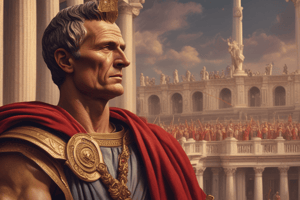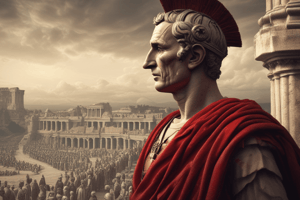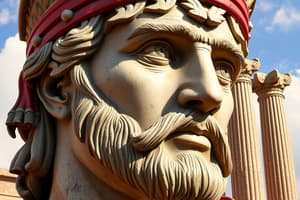Podcast
Questions and Answers
What contributed to Caesar's rise to fame besides his victories on the battlefield?
What contributed to Caesar's rise to fame besides his victories on the battlefield?
- His ability to manipulate Roman politics (correct)
- His strong alliances with other military leaders
- His direct lineage to Roman royalty
- His control over the Roman economy
What was the significance of Caesar crossing the Rubicon river?
What was the significance of Caesar crossing the Rubicon river?
- It signified his retirement from politics
- It represented a peace treaty with the Senate
- It symbolized his defeat in battle
- It marked the end of the Roman republic (correct)
What led to Caesar's assassination on March 15, 44BC?
What led to Caesar's assassination on March 15, 44BC?
- The Senate's desire to reward him for his leadership
- A failed attempt to overthrow the Senate
- His successful military campaigns
- Fear among the Roman elite over his dictatorial ambitions (correct)
How did Caesar appeal to the lower classes of Rome?
How did Caesar appeal to the lower classes of Rome?
What impact did Julius Caesar have on Rome despite his untimely death?
What impact did Julius Caesar have on Rome despite his untimely death?
How is Caesar's legacy viewed by different individuals?
How is Caesar's legacy viewed by different individuals?
When was Julius Caesar born?
When was Julius Caesar born?
Which of the following offices did Julius Caesar's father and maternal ancestors hold?
Which of the following offices did Julius Caesar's father and maternal ancestors hold?
Who was Julius Caesar's sibling who later became the first emperor of the Roman Empire?
Who was Julius Caesar's sibling who later became the first emperor of the Roman Empire?
What region did Julius Caesar govern before becoming involved in Roman politics?
What region did Julius Caesar govern before becoming involved in Roman politics?
What qualities led young Julius Caesar to strive for military accomplishments and astute politics?
What qualities led young Julius Caesar to strive for military accomplishments and astute politics?
In which period of Roman history did Julius Caesar rise to prominence?
In which period of Roman history did Julius Caesar rise to prominence?
Flashcards
Who was Julius Caesar?
Who was Julius Caesar?
Gaius Julius Caesar, a Roman general, politician, and writer, born in 100 BCE, is recognized as one of the most influential figures in Roman history.
What was the Roman Republic Crisis?
What was the Roman Republic Crisis?
The Roman Republic Crisis was a turbulent period in Roman history marked by social unrest, political instability, and civil wars, lasting from 133 BCE to 27 BCE.
What was the consulship?
What was the consulship?
The highest political office in ancient Rome was the consulship, holding immense power and authority over the state.
Who was Octavianus?
Who was Octavianus?
Signup and view all the flashcards
What was Caesar's military career like?
What was Caesar's military career like?
Signup and view all the flashcards
Where was Caesar governor?
Where was Caesar governor?
Signup and view all the flashcards
What did Caesar do by crossing the Rubicon?
What did Caesar do by crossing the Rubicon?
Signup and view all the flashcards
When was Caesar assassinated?
When was Caesar assassinated?
Signup and view all the flashcards
Why was Caesar assassinated?
Why was Caesar assassinated?
Signup and view all the flashcards
What was Caesar's legacy?
What was Caesar's legacy?
Signup and view all the flashcards
What is the Pax Romana?
What is the Pax Romana?
Signup and view all the flashcards
How has Caesar's story been preserved?
How has Caesar's story been preserved?
Signup and view all the flashcards
Study Notes
Julius Caesar - A Biography of Rome's Greatest General
In the first century BCE, during one of history’s most tumultuous periods known as the Roman Republic Crisis, there rose a figure who would change Rome forever – Gaius Julius Caesar. Born on July 17, 100 BCE, into a powerful patrician family, he was destined to become Rome’s greatest general, politician, and reformer. This is his story.
Early Life and Family Lineage
Caesar came from a distinguished lineage with both fatherly and maternal ancestors serving as consuls, the highest political office in ancient Rome. He had several siblings, including Octavianus, who later became Augustus, the first emperor of the Roman Empire. Influenced by his family background and their achievements, young Caesar strove to follow in their footsteps and make his own name through military accomplishments and astute politics.
Military Career and Politicking
As a promising young man, Caesar joined the army and quickly proved himself capable in warfare. His successes led him down a path where he saw the potential for personal gain in the chaos of Roman politics. By the late 50s BC, Caesar had risen to become the governor of Cisalpine Gaul, Northern Italy. There, he faced numerous challenges, which he met with resilience and determination, cementing his reputation as a skilled leader and military strategist.
However, it wasn't only his victories on the battlefield that propelled Caesar into stardom; his ability to navigate the complex world of Roman politicking also played a significant role. He knew how to play the game well, using bribes, patronage networks, and alliances to further his cause. Despite being part of the aristocracy, he appealed to the people, particularly the lower classes, appealing to them with promises of land and wealth.
Crossing the Rubicon
One of Caesar's more notable actions was when he crossed the Rubicon river, a clear act of defiance against the Senate. Traditionally, this meant civil war since the river marked the boundary between Rome's Italian provinces and its capital city. However, this step effectively ended the Roman republic and paved the way for the rise of an autocratic ruler like Caesar.
Assassination and Legacy
On March 15, 44BC, while celebrating the Ides of March, Caesar was assassinated on the floor of the senate house. Although the motive behind his murder was largely due to fears among the Roman elite over his dictatorial ambitions, many also believed he posed a threat to traditional Republican values. Nevertheless, despite his untimely death, Caesar made an indelible impact on Rome, laying the foundation for what would eventually become the Roman Empire.
Caesar's legacy is complex, with some viewing him as a tyrant intent on amassing power for himself, whereas others consider him a visionary whose leadership saved Rome from collapse. Regardless of perspective, few can deny his profound influence on the course of Roman history. As time passed, the Republic gave way to Imperial rule under powerful figures such as Augustus, and much of the administrative structure and culture they created remain with us today.
Throughout history, Caesar has been portrayed in various media. Shakespeare immortalized him in his famous play 'Julius Caesar', and countless books have been written about him, solidifying his place in Western literature. More recently, he has even appeared in popular video games and animated series, maintaining his relevance across different mediums.
Conclusion
Despite a turbulent life filled with conflict and deceitful allies, Julius Caesar remained steadfast in pursuing his goals, becoming one of history's most remarkable individuals. His unwavering dedication to leading Rome towards greatness laid the groundwork for the era we now call the Pax Romana, the period of relative peace and prosperity in the Roman Empire. Therefore, although Caesar is remembered for his controversial, if not tragic end, his lasting contribution to Rome cannot be denied.
Studying That Suits You
Use AI to generate personalized quizzes and flashcards to suit your learning preferences.
Description
Test your knowledge on the life and legacy of Julius Caesar, one of ancient Rome's most influential figures. Learn about his military career, political ambitions, crossing the Rubicon, and his assassination. Explore his complex legacy and lasting impact on Roman history.




